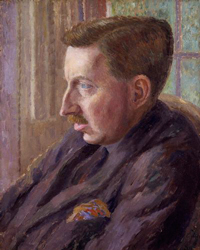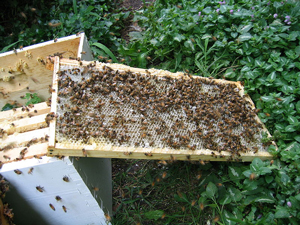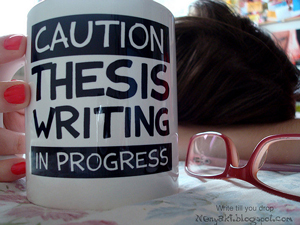
Source: Writing, Rubin 110, Flickr
You may think it’s strange to revise a thesis. Your whole essay is based on your thesis. If you revise it, won’t that mean you have to revise the entire essay?
In a perfect world of perfect writers, it will probably be true that once you have decided on the main idea of your essay, the main idea would not change. However, writers don’t write in a perfect world, and (for the most part) writers aren’t perfect. Sometimes you will discover your topic as you write. As a result, your ideas will change so that when you finish, the idea you started with is no longer the center of your essay.

Source: E. M. Forster von Dora Carrington, 1924-25, Dora Carrington, Wikimedia
The famous writer E. M. Forster said “How can I know what I think till I see what I say?” Forster was an important novelist and essayist. You are in good company if you end up saying something different from what you thought you would say when you started.
When you find out that your thesis doesn’t match your essay content, what should you do about it?
The thesis is important because it focuses the essay. The whole essay should be constructed to develop one main idea. If the whole essay develops a main idea, but the main idea is different from the thesis that you stated or suggested in your introduction, the most obvious thing to do is to change the thesis.
A promise with the reader

Source: Honey Bees on Comb, Killerlimpet, Wikimedia
The thesis makes a promise to the reader. If your introduction states or suggests that the essay will be about the moneymaking possibilities of keeping honey bees, you had better write about the moneymaking possibilities of keeping honey bees. Otherwise, your readers will be at best confused and at worst annoyed.
OK, so what if you begin writing about the bees, but then as you write, your interest and focus move toward how fascinating it is to observe honey bees at work? You haven’t made the promise yet because you are still writing the essay. Instead of promising to write about money, you can adjust the thesis so it promises to explain how fascinating it can be to observe the bees.

Source: Ethiopian Theotokos, Wicker Park grace, Flickr
Let’s look at an example of how this works. Let’s say you decide to write an essay about learning honesty from your mother. You plan to show how honest your mother is. The thesis is “My mother is a model of honesty.”
After you finish writing, you look at what you have written and find these subtopics:
- My mother expected me to be honest with her.
- My mother got angry when she discovered I wasn’t honest.
- My mother taught me to be honest with my friends.
- I have learned to be honest from watching my mother.
Is the focus of this paper “My mother is a model of honesty”?
The answer is no. Which of the following is a better statement of focus for this paper? Click in the box beside to your choice.

Source: Write till you drop!, nenyaki, Flickr
You sometimes have to “look at what you’ve said” to find out “what you think.” Always reread an essay to check the accuracy of your stated (or implied) thesis. Don’t be surprised if you end up with a different topic than the one you intended.
Of course, there are times when you have to be sure not to stray from what is expected or required: when answering essay questions on a test or when writing an essay to respond to a prompt, for example.
If a prompt asks you to respond to a particular quotation, you can’t write about a different quotation. In this case, your thesis shouldn’t be changed if the change means it no longer responds to the prompt. In any situation where you have a choice of thesis, however, the first step is to adapt your thesis to reflect the main idea of your essay.